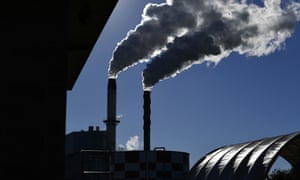Carbon Market Institute survey finds 96% believe Australia should not delay transition to decarbonised economy
Australian businesses are calling for a more ambitious national
climate policy, backing a target of net zero emissions by 2050 and
raising concerns about the lack of a coordinated energy policy and the
government’s proposed use of carryover credits.
The findings are contained in a Carbon Market Institute survey of more than 200 businesses, to be released on Thursday, which reveals 96% of those surveyed believe Australia should not delay the transition to a decarbonised economy.
About a third of businesses surveyed are emissions intensive companies that have obligations under the National Greenhouse and Energy Reporting Act, and include the mining, oil and gas and manufacturing industries. Others surveyed include investors, carbon project developers, carbon market experts and professional service providers.
The survey finds widespread concern among business and industry
groups about the government’s current policy settings, with 94% saying
the approach is insufficient to meet Australia’s 2030 Paris commitment
to cut emissions to 26%-28% of 2005 levels. This was an increase from
the 92% who expressed the same view in 2018 when the survey was last
undertaken.The findings are contained in a Carbon Market Institute survey of more than 200 businesses, to be released on Thursday, which reveals 96% of those surveyed believe Australia should not delay the transition to a decarbonised economy.
About a third of businesses surveyed are emissions intensive companies that have obligations under the National Greenhouse and Energy Reporting Act, and include the mining, oil and gas and manufacturing industries. Others surveyed include investors, carbon project developers, carbon market experts and professional service providers.
A similar number of respondents were concerned that current policies were also inadequate to help business manage the risks and capitalise on the opportunities in the transition to a net-zero emission economy.
Corporate regulators, the Australian Securities and Investments Commission (Asic) and the Australian Prudential Regulation Authority (Apra) have also warned that climate change is a foreseeable risk for corporate Australia.
The findings come as Australian officials return from the UN climate change conference in Madrid after defending the country’s plan to use 411 million tonnes of emissions credits from the Kyoto protocol to meet its Paris targets.
On Wednesday, the energy minister, Angus Taylor, told the Australian Financial Review that Australia could possibly meet its abatement targets without the use of carryover credits, claiming the government was already “over delivering”.
But a government report released last month showed the Coalition was relying on the accounting loophole negotiated, with Australia expected to achieve just a 16% cut below 2005 levels by 2030 if they did not use the credit.
The carryover credit comes from Australia achieving a better result than it agreed to under the first Kyoto target, which allowed for an 8% increase in emissions between 1990 and 2010.
The CMI survey finds that about three-quarters of business respondents (76%) do not believe that Australia should be able to use the carryover units to achieve its 2030 emission reduction target, joining critics and other countries who want the practice banned.
Also heaping pressure on the government to set more ambitious mid-century targets, which the Coalition has indicated will be outlined next year, the vast majority of businesses (83%) support a national target of net-zero emissions by 2050.
Almost all of those surveyed (96%) agreed that the longer Australia delays decarbonisation, the more “abrupt, forceful and disruptive” the policy response will need to be, especially for carbon-intensive industries.
When asked what Australia’s long-term policy should look like, the business leaders surveyed nominated a legislated net-zero 2050 target, coupled with a coordinated national climate policy suite to meet the target with a clear trajectory that was regularly reviewed.
They also called for “sectoral decarbonisation strategies” that identified abatement potential, structural barriers and economic opportunities, a price on carbon, and a plan to ensure orderly closure of old coal plants and their replacement with clean energy.
The survey shows support for changes to the safeguard mechanism, which sets emissions caps for high emitting facilities, with 83% of businesses wanting the baselines set under this scheme to be reduced. About three-quarters (74%) want lower-emitting facilities also to be captured under the mechanism.
Australia has been left without a cohesive national energy policy after Scott Morrison dumped the national energy guarantee that helped terminate Malcolm Turnbull’s leadership.
In a sign that the issue of climate change and carbon emission reduction is becoming more pressing, 84% of survey respondents reported that their organisation recognises the financial and strategic risks of climate change at a board and executive level.
Just under half (42%) reported increased shareholder engagement regarding climate change for their organisation in the past 12 months.
The chief executive of CMI, John Connor, said there was a gap between business expectations and government policy that was concerning business.
“This survey tells us that many in Australian business – including Australia’s highest-emitting companies – are already planning to transition to a net-zero emissions world,” Connor said.
“Business is looking for more ambitious climate policies to set a defined pathway and assist them in managing this.”
Connor said Australian businesses were grappling with the knowledge that science required net-zero emissions by 2050, while also dealing with “policy volatility, evolving global carbon markets, investor calls for action and reporting requirements”.

No comments:
Post a Comment